SPOTLIGHT 💡🔦
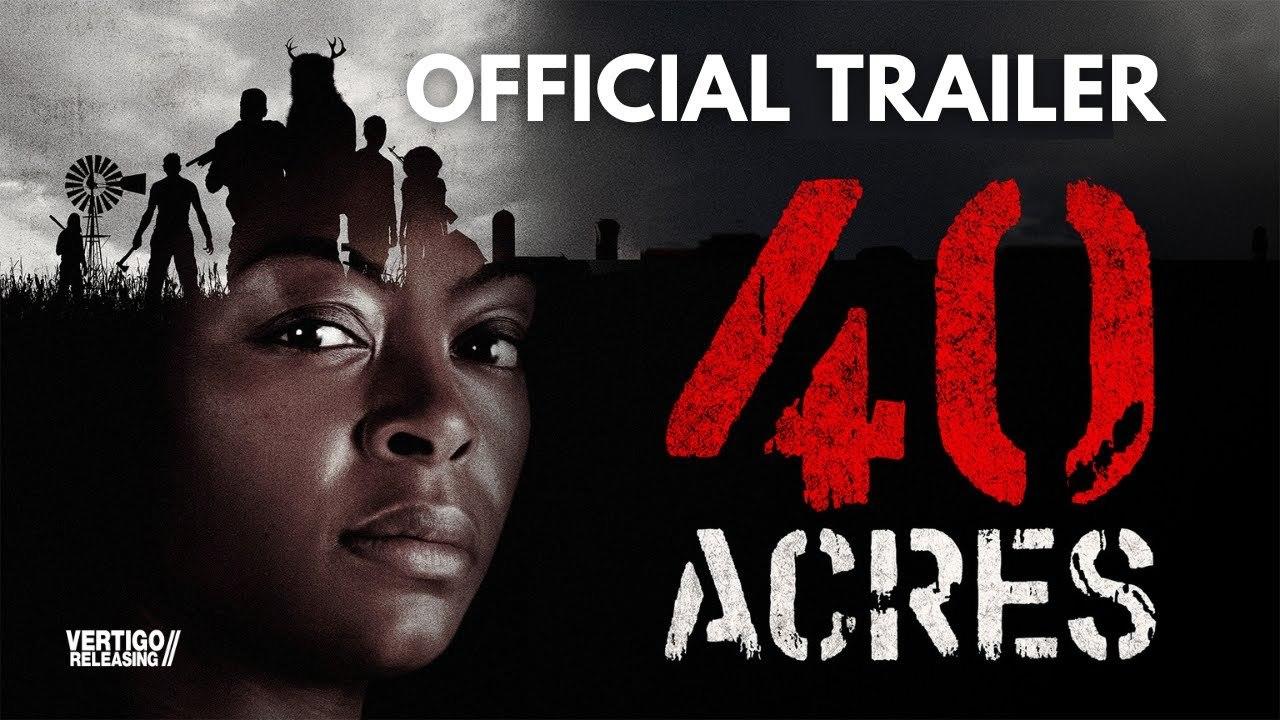
R.T. Thorne, Toronto Filmmaker, Brings Depth and Diversity to the Screen with Post-Apocalyptic Thriller ‘40 Acres’
photo credit: Rafy, courtesy of Mongrel Media
By Flavian DeLima
R.T. Thorne's (@directedbyrt) critically acclaimed film 40 Acres has been making waves across North America since its premiere at the Toronto Film Festival in 2024. It was released in North American theatres July 3, 2025. This post-apocalyptic survival thriller follows a Black and Indigenous family of farmers defending their generational land in a world ravaged by food insecurity and famine.
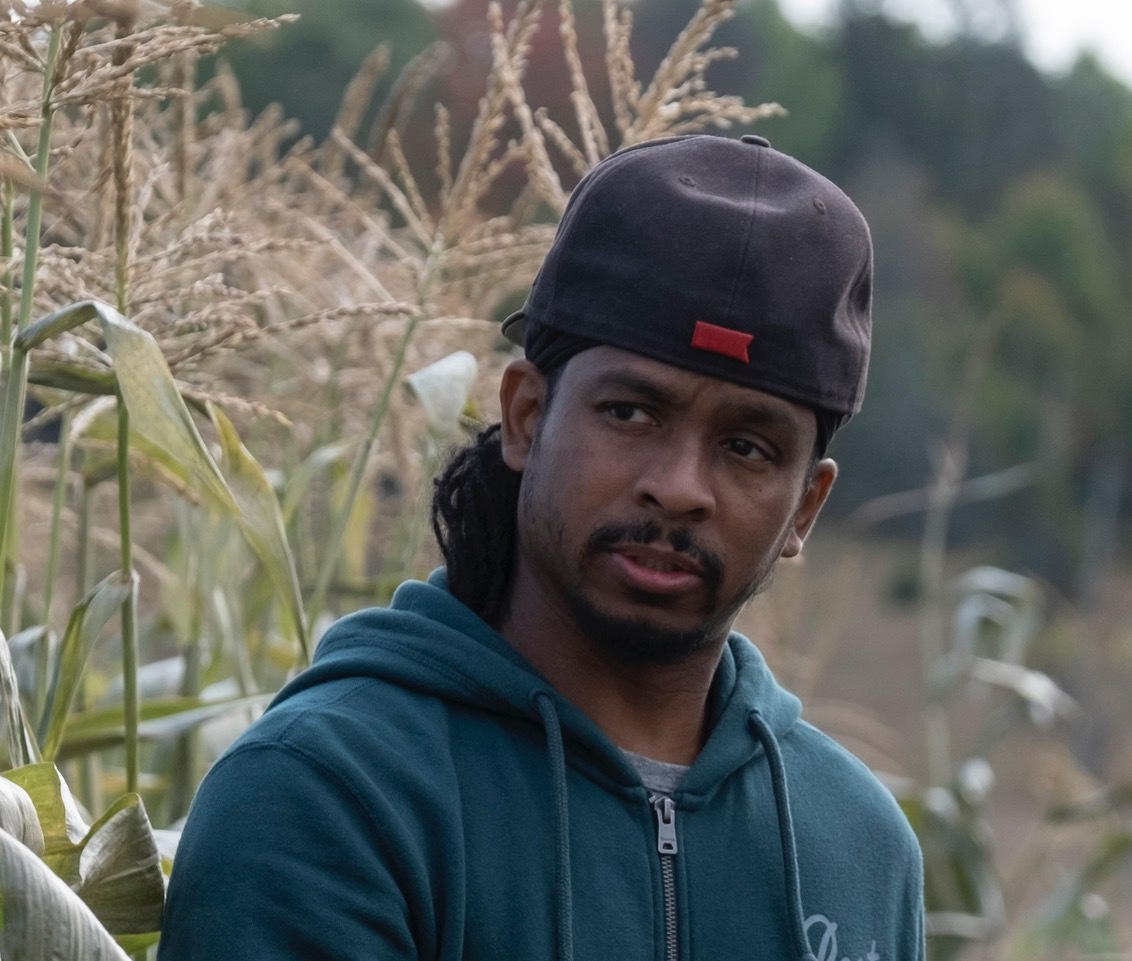
Photo credit: Rafy, courtesy of Mongrel Media
Spinning Forward spoke with Thorne, who is based in Toronto, to talk about his upbringing in Canada, his creative journey, community building and his approach to authentic storytelling in film. Thorne is a creative who has been deeply influenced by his roots, his mother, and representation on the screen.
In describing his film, 40 Acres, Thorne says,
"It's a survival thriller about a family of farmers, specifically Black and Indigenous farmers, in sort of a post-apocalyptic future, although you might say a post-apocalyptic present, five minutes from now."
The film's title references the generational farm that "has been left to the matriarch for over 200 years, tracing back to when her ancestors escaped to Canada via the Underground Railroad and secured 40 acres of land north of the border."
The interview has been lightly edited for clarity.
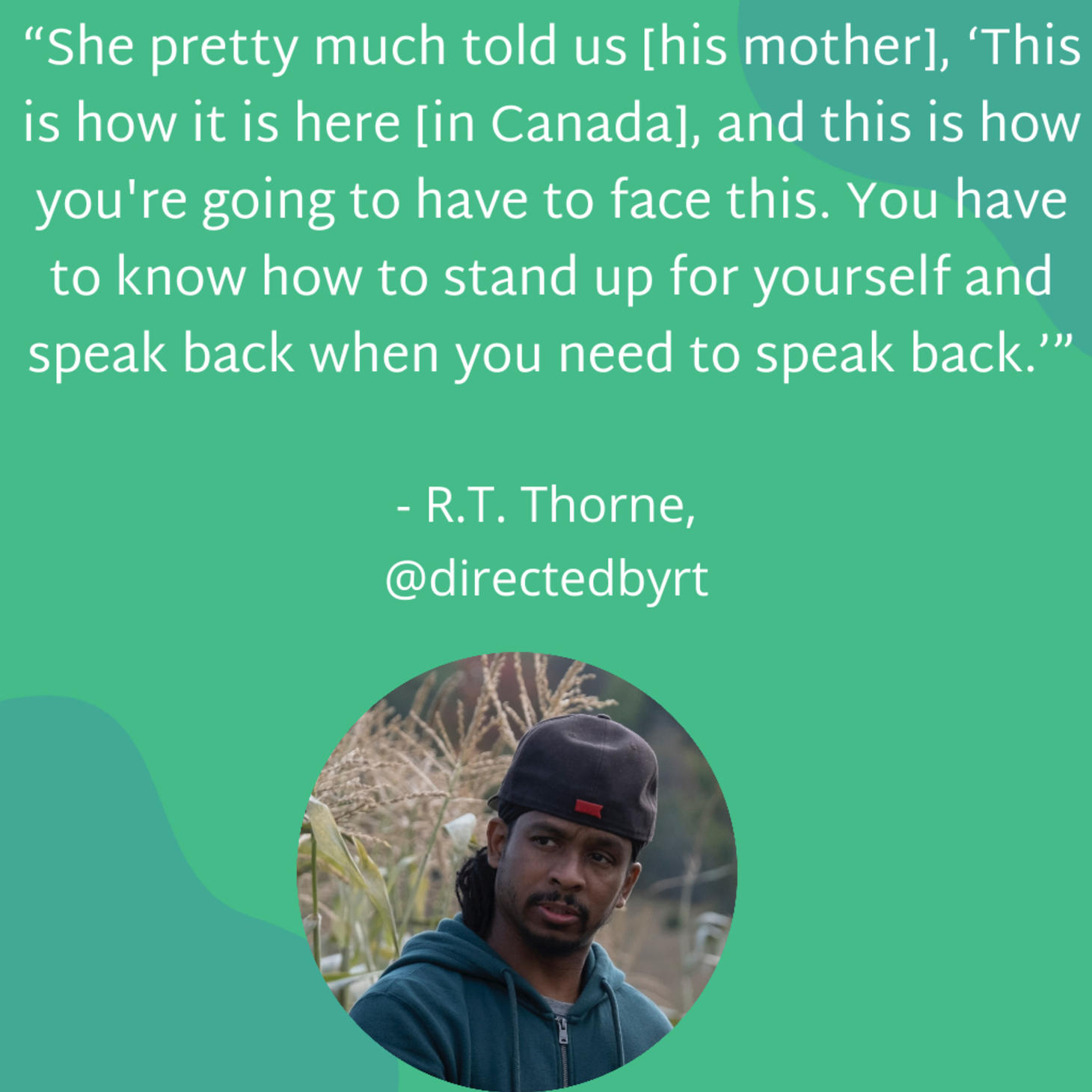
Growing up in Canada and his Mother's Experience with Racism
Spinning Forward: You moved from Calgary to Toronto just before high school. How did your mother's experiences with racism and misogyny affect you as a young person, and how did that inform your creative development?
R.T. Thorne: When you're young and you see these things, you don't understand them very much. You know something happened when you feel your parents—in my case, my mother—being spoken to in certain ways or dismissed, and you ask about those things.
My mother wasn't one to mince words. Where she came from, a lot of people looked like her, so she didn't experience that kind of discrimination. But when she came to Canada in the '80s, some of that stuff was pretty out in the open—not to mention misogyny. As a woman, she was coming into a man's world at that time.
She pretty much told us, "This is how it is here, and this is how you're going to have to face this. You have to know how to stand up for yourself and speak back when you need to speak back." She wasn't somebody who would sit and take abuse or discrimination. She would open her mouth and tell people where they need to go.
Spinning Forward: It sounds like she was very intentional about your education as well.
R.T. Thorne: Absolutely. She was very strict with us and really wanted us to understand our history and where we came from. She said, "This country is not necessarily going to teach us about those things. They have their own things they want to teach you about, and that's fine. You're going to learn those things, but you're going to learn our history too."
She had us doing book reports on the weekends. She would assign us books and have us write reports. She'd say, "You're not just going to read it. You're going to tell me what you think about it. I want you to be critically thinking about this stuff."
It was a strict and tough childhood, but one that I value incredibly. It sparked my creative mind, reading Octavia Butler. My brother was very big into science fiction and fantasy novels, and he got me into that stuff and comic books. That really awakened me to the power of genre and how you can tell stories that are meaningful and touch people on different layers, but that can also be exciting.
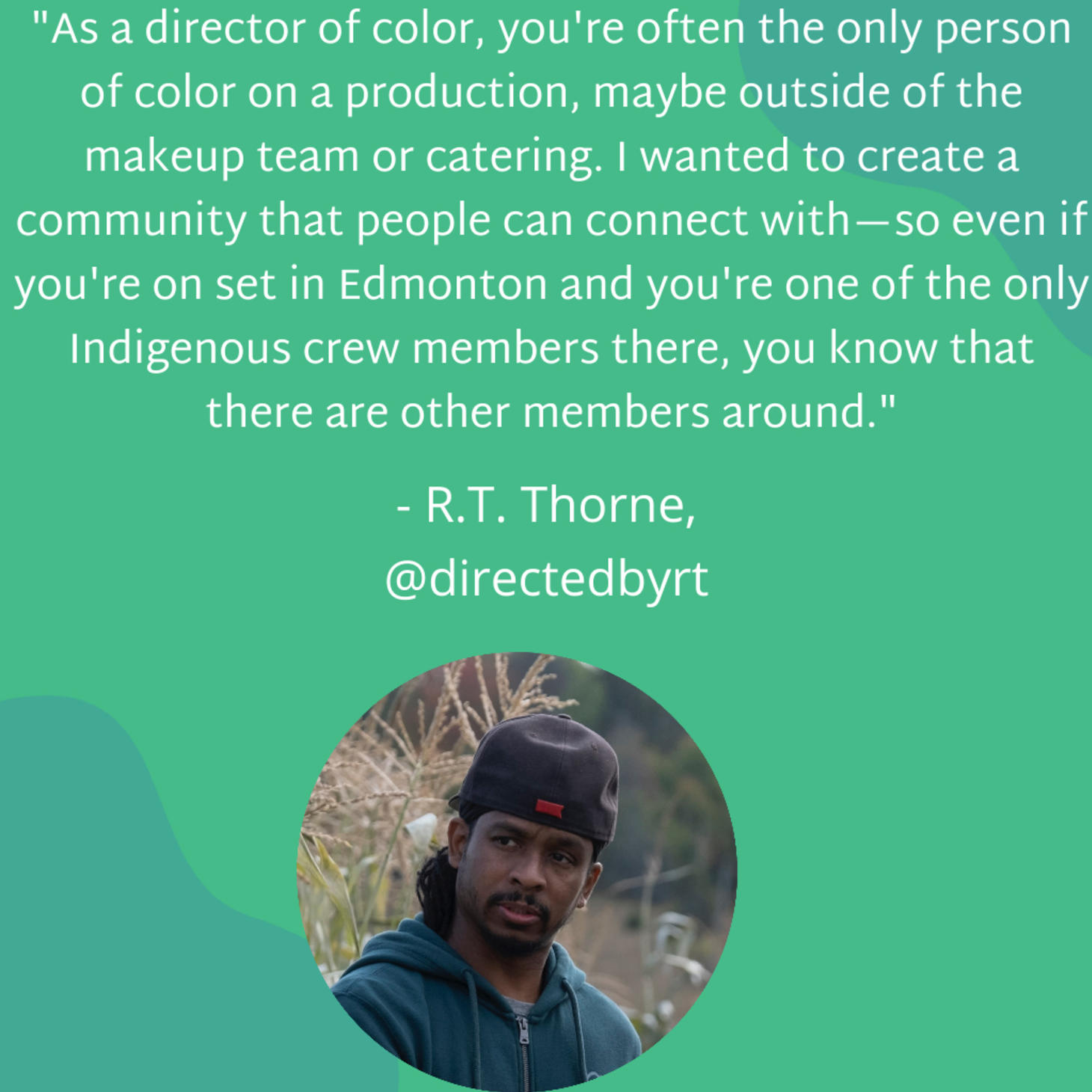
Setbacks, Resilience and a Creator's Career Path
Spinning Forward: Your brother became a lawyer—the more traditional path for an immigrant family—while you pursued the creative route. How did that work out in your family dynamic?
R.T. Thorne: Thank God he went down that route! I don't know if my mother would have been so supportive otherwise. You know what it's like in an immigrant family—there aren't many career choices they want you to pursue. So my brother moving into law put my mom somewhat at ease. She'd say, "At least we got one lawyer in the family."
My brother's older than me, so he paved the way. I definitely couldn't have gone first. But I think my mom recognized that I'm the type of person who thrives in things that I love. If I get to pursue something I love, I'm not sleeping—I'm going to be working on it nonstop. She could see the work ethic she instilled in both of us, but for me, it was about the creative stuff I loved.
Spinning Forward: Your path to filmmaking wasn't straightforward. Can you tell us about some of the setbacks and how you persisted?
R.T. Thorne: Initially, I went to Sheridan College to try to go into their animation program. This was just around the time that Pixar was coming out with Toy Story and Monsters, Inc. But when I got to Sheridan, I just didn't work well in that structured environment.
I dropped out, and my mom said, "You're going back to school next year, and you're going to work. You're getting however many jobs to pay back the tuition you squandered." I had to get three jobs. Then she said, "You're going right back into school."
I looked at Ryerson (now TMU), and I was interested in film. My mother said, "You're not going to do film because who knows if it's going to happen. But you could do television and radio arts because it's related, and they have guaranteed contracts." So I did that, and within the first year, there was a short film program that I dabbled in and just fell in love with.
Spinning Forward: You later became involved with The Remix Project, mentoring young people from underrepresented communities. What was that experience like for you?
R.T. Thorne: It was incredibly fulfilling to see change and see the creative juice awaken in a young mind. To let them see that their personal story, that they don't think is important, can touch people and influence others.
We started a film program called City Light Films with what is now known as Boat Rocker Studios. We teamed up young creatives with professional crews and actual actors, and took them through scriptwriting through to production. Then we would present their films at the TIFF Lightbox building, putting their films on the big screen.
For a good four or five years, it was the highlight of my year doing those things. Some of them have gone on to great things. One of them was an editorial assistant on 40 Acres, and another produced a television show called Bria Mack Gets a Life.
Spinning Forward: You also became Chair of Director's Guild of Canada BIPOC Members Committee in 2020 to present. What motivated that decision?
R.T. Thorne: As a director of color, you're often the only person of color on a production, maybe outside of the makeup team or catering. I wanted to create a community that people can connect with—so even if you're on set in Edmonton and you're one of the only Indigenous or people of color crew members there, you know that there are other members around. We can share resources and stories, talk about commonalities, and figure out how we can recruit more diverse talent.
Spinning Forward: The seeds of '40 Acres' were planted during your time at the TIFF Filmmaker Lab (formerly Talent Lab) in 2018. Tell us about your journey to get there.
R.T. Thorne: I tried to get into TIFF Talent Lab two times before they accepted me. And yes, 40 Acres was there, a version of the idea, not quite where the film ended up obviously.
If something doesn't work out for me, it's not that it's not meant for me. It's just this timing didn't work out. And if I feel like it's meant for me, I'm going to keep going for it. I wanted to learn from the people that present and bring film on a major level to our city and country. What better place to learn than there?
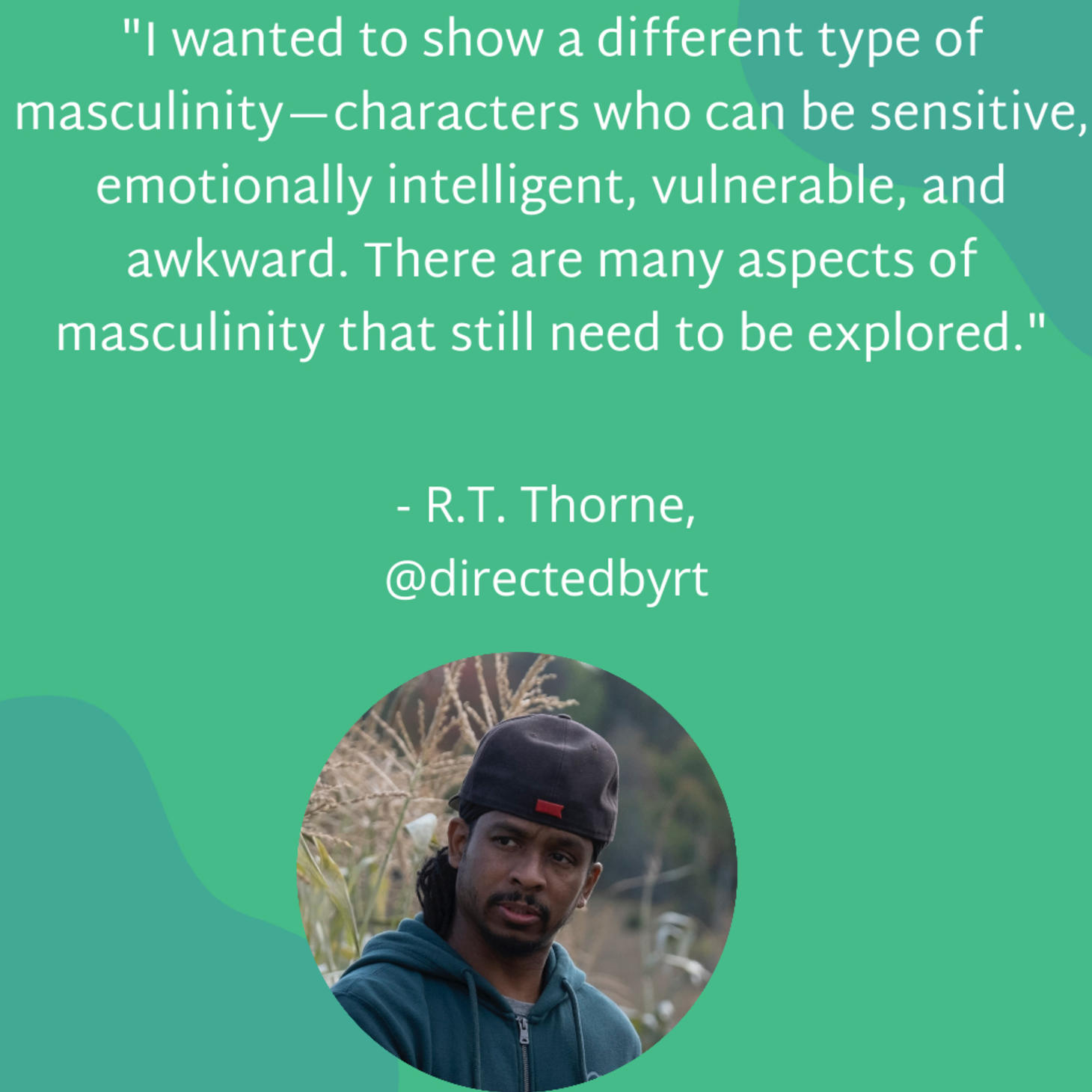
Moving Past Stereotypes: New Narratives and Representation in '40 Acres'
Spinning Forward: With 40 Acres, you've created something unique. What made you decide this was the story you needed to tell?
R.T. Thorne: I think filmmakers who are at home with themselves and telling stories from a deep personal place are the ones whose films connect the most with me. In the current landscape, where people just want to get something out there and be on the scene, it can be lost trying to make something that doesn't mean very much to you.
I wanted to make something that actually meant something to me but also fulfilled what I loved as a teenager—genre storytelling that makes you think and want to talk about it afterward. It took me a while to find it. I was getting a lot of scripts in those early days, and they were very stereotypical things. So I said, "No, I'm going to sit here and figure out what I feel."
The relationship between Manny Freeman (played by Kataem O'Connor) and his mother Hailey (played by Danielle Deadwyler) in the film is an echo of me and my mom. I wanted to pay tribute to the journey of mothers who have to deal with protecting children at risk—especially immigrant mothers or mothers of color dealing with additional pressures, as my mother did.
Spinning Forward: The character of the son, Manny is not the stereotypical young man we often see on screen. In the film, he is sensitive, curious, emotionally vulnerable, and open. Was that a conscious choice?
R.T. Thorne: There's a lot of me in there. I used to draw a lot and wanted to get into animation. You see Manny taking off on his little all-terrain vehicle (ATV). The Walkman he plays —I had that same yellow Sony Walkman, escaping through music.
I wanted to show a different type of masculinity in this film, both through Manny Freeman (Kataem O'Connor) and Galen (played by Nehiyaw (Cree) actor, Michael Greyeyes)—characters who can be sensitive and emotionally intelligent but can also be strong when they need to be, can be vulnerable, can be awkward.
Masculinity has unfortunately felt like a bad word in the past little while. But there are many different aspects of masculinity that still have to be explored because they were only explored through one lens for such a long time. I'm very eager to explore more of that complexity.
Spinning Forward: You spent six years developing this film, including through the pandemic. Looking back now that it's been released to such acclaim, are you taking time to enjoy this moment?
R.T. Thorne: I've never been very good at that. I've kind of been somebody that's like, "All right, I did it, and now I'm going to move on." But this has been a really incredible journey.
The rollout, the reception it's gotten, and hearing from regular people from all across North America sending random messages telling me how they connected with the film—it's been incredible. It's such a blessing and the dream of every filmmaker to have a film come out in your hometown festival, have your mom come see it, and then get an actual release across both nations. It's been beautiful.
R.T. Thorne’s film 40 Acres blends great storytelling with personal themes of family and heritage, showing his dedication to authentic and diverse voices in Canadian film. He’s seen as a standout talent, and we're eager for his next project.
QUICK HITS
⚖️ Trump targets “woke A.I.”: In July, President Trump signed an executive order. It targets what he calls “woke A.I.” saying AI is biased against conservatives. He wants rules to curb political slant in tech. Supporters call it fairness and transparency.
Why it matters: It could change content rules, free-speech protections, and chatbot policies. Critics warn of weaker safeguards, a vague “bias” rule that chills lawful speech, First Amendment risks, politicized oversight, unclear rules, and more government control. Source: New York Times article
📈 Social shares surge, follower growth slows: Forget follower counts—sharing is where the real power is now. New research from Dash Social, a social media management platform, shows follower growth is tanking (down 27% on TikTok, 14% on Instagram), but share rates are climbing fast. Content that gets people sharing is what really moves the needle. When someone shares your post, they're basically vouching for you to their friends. Source: Dash Social 2025 Social Media Trends Report
🔥 Millennials are flocking to LinkedIn for real convo: Especially in Canada, millennials are choosing LinkedIn over shallow feeds for thoughtful discussions. Founders and freelancers are succeeding by sharing quick takes on AI, robotics, careers, and market shifts. Quick Tip: Join niche groups, follow credible people, and post short but consistently. Source: Toronto Star
EVENTS 📅
🎭 The Mississauga Multilingual Fringe Festival 2025 runs from August 11 to 24, featuring 48 performances of 12 plays in Hindi, Marathi, Punjabi, Urdu, and English. Shows take place at AN1 Studios (Aug 11–17) and Sampradaya Theatre (Aug 18–24). Presented by SAWITRI Theatre Group, an award-winning South Asian theatre company in Mississauga that highlights women’s voices and social issues through original works.
Show List: Plays include At the End of Kalyug, Ek Ladka Hua Karta Tha, Bandh Lifaafe, Gaumukhi, The Trials by Sita, Out of Bounds, Tax Free, In His Time, Ankahein Samvaad, Dukhde Rishte, The Proposal, and 1947 Aur Alzheimer’s. Tickets are $15 per show with free parking. Source: mississaugafringe.ca
WE ❤️ FEEDBACK 📋
What'd you think of today's issue? 👂
💫 You need to take it up a notch
Spinning Forward is an award-winning, trusted, local, independent media company that informs, engages, and uplifts aspiring content creators of color aged 16 to 34 in the Toronto region. Flavian DeLima (LinkedIn), the founder and publisher, launched Spinning Forward to help level the playing field in the online economy for creators of color.
CONTRIBUTORS
John Tse, Natasha Jogezai, Sofia Dela Roca
If you like this issue, please share it with a few friends. To view all past issues on the Web, go here
If you want to be featured, have a comment or want to suggest a topic or creator, reply to this email or click here or the "Suggest a link" at the bottom of any issue.
For questions, comments or sponsorships, reply to this email or email info at spinningforward dot com.

COMMENT 💬
Greetings,
As we approach the end of an unusually hot summer, I've taken some time away from our newsletter to engage with creators and organizations throughout the Toronto region. My goal was to listen, learn, and understand the community’s information needs, fears, and goals, as well as to identify the resources required.
Spinning Forward is a trusted local media company dedicated to amplifying and creating space for younger voices, particularly creators of color.
Here’s what we’ve heard and are acting upon:
Spinning Forward is launching a new website in the fall and will be expanding efforts in all the above areas.
Feel free to reply to this email or contact me at info (@) spinningforward.com with suggestions or comments about strengthening the BIPOC creator community in the Toronto region.
In this issue:
Reading Time: 6-8 minutes
Flavian DeLima
Publisher & Editor, Spinning Forward